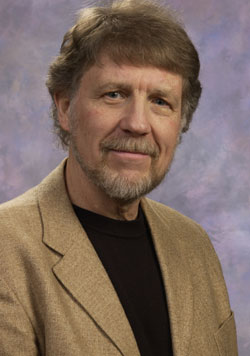University News
Spirituality and Religion Topic of 2004 Distinguished Faculty Lecture
February 19, 2004
MACOMB, IL - - Spirituality and religion is the topic for Western Illinois Universitys 2004 Distinguished Faculty Lecture, which will be presented by philosophy and religious studies Professor Paul Mundschenk on Thursday, March 25 on the Macomb campus and on Tuesday, April 13 on the Quad Cities campus.
His lecture, Spirituality and Religion, Love and War: Whither the Human Future?, will be presented at 7:30 p.m. March 25 in the College of Fine Arts and Communication Recital Hall, located in Simpkins Hall; and at 3:30 p.m. April 13 in Room 102 at the WIU Quad Cities campus.
Mundschenk will explore the ambiguity of the terms spirituality and religion, two distinct phenomena which most people consider closely related; analyze and describe them as two distinct styles of response to the basic nature of the human condition; examine each style in terms of human relationships; and offer predictions for the probability of the convergence and evolution of the two phenomena.
Spirituality and religion are not the same thing. Spirituality engenders openness, receptivity and inclusiveness in human relationships, while religion has a much greater tendency to encourage a sense of separateness and exclusivity, Mundschenk said. Each embodies a different style of response which determines the character of our relationships.
While his intent is not to undermine religion or religions, Mundschenk contends that if the human community is to flourish in the future, then the convergence of spirituality and religion will see the religious style evolve and change so as to shed its tendency to divide and exclude.
Clearly, spirituality will help generate a human future where the fruits of love, not war, are dominant, he added.
Mundschenk, who joined the Western Illinois faculty in 1975, was named the Outstanding Teacher in the College of Arts and Sciences in 1989. In 1986 Mundschenk wrote and was the on-camera lecturer for a 35-hour television course, Religions of the World, which aired on CONVOCOM, public television in western and central Illinois. He also has taught six summer courses at the Graduate Theological Union, Berkeley, CA; the latest, The Spiritual Quest in a Secular World, in 2001.
After earning a bachelors degree (1962) in psychology from Gettysburg College, Mundschenk served (1963-1965) as a Peace Corp volunteer in rural community development with the Guambiano and Paez Indians in Colombia.
In 1968 he spent six months in Israel, working on two kibbutzim (corporative farming settlements) and on an archaeological excavation in Tel Anafa, which he said, provided an experiential introduction to modern, living Judaism, as well as acquaintance with the land considered holy to the three principal Western religions.
Mundschenk also spent the summer of 1970 at the Daitoku-ji Zen Monastery in Kyoto, Japan, studying Buddhist art and practicing zazen meditation.
He has twice received grants to study in India. The first (1973-74) was a Fulbright Doctoral Dissertation Research Abroad grant to the Centre for Advanced Study in Philosophy at the University of Madras, where he researched Sri Aubobindo, who founded the spiritual practice known as Integral Yoga. He returned to India in December 1978 to attend to the International Seminar on Folk Culture on an American Council of Learned Societies travel grant.
Mundschenk has authored two book chapters: Aurobindo, which appears in Great Thinkers of the Eastern World, edited by Ian P. McGreal, HarperCollins Publishers, 1995; and The Heart of Satyagraha: A Quest for Inner Dignity, Not Political Power, which appears in Gandhis Significance for Today: The Elusive Legacy, edited by John Hick and Lamont C. Hempel, Macmillan, 1989. He has also written numerous articles and has chaired and presented panels at many international conferences.
Mundschenk studied at the Princeton Theological Seminary in a two-year pre-doctoral program and received his Ph.D. in Asian Studies from Claremont (CA) Graduate University (1976).
WIU first presented an annual lecturer award in 1969 to honor an outstanding faculty member whose professional development in research or creative activity, teaching and service to the University represent the highest standards of the academic community. In 1998 the award was renamed the Distinguished Faculty Lecturer.
Posted By: University Communications (U-Communications@wiu.edu)
Office of University Communications & Marketing


Connect with us: